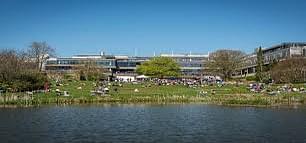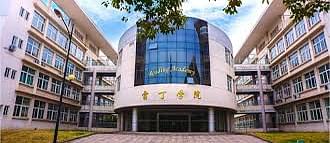Doctor of Philosophy [Ph.D] (Computer Science)
Field of Study:
₹33.7 L/Yr
Tuition Fees
| Year | 1st Year Fees |
|---|---|
| Tuition Fees | ₹3370752 (GBP 28800) |
Previous Year Tuition Fees
| Year | 1st Year Fees |
|---|---|
| 2021 | ₹2844072 (GBP 24300) |
Important Dates
No Deadline is available, students to enroll atleast 2 month prior the course starting date.
Research supervision is available under our six research areas, reflecting our strengths, capabilities and critical mass.
Advanced Model-Based Engineering and Reasoning (AMBER)
The AMBER group aims to equip systems and software engineering practitioners with effective methods and tools for developing the most demanding computer systems. We do this by means of models with well-founded semantics. Such model-based engineering can help to detect optimal, or defective, designs long before commitment is made to implementations on real hardware.
Digital Interaction Group (DIG)
The Digital Interaction Group (DIG) is the leading academic research centre for human-computer interaction (HCI) and ubiquitous computing (Ubicomp) research outside of the USA. The group conducts research across a wide range of fundamental topics in HCI and Ubicomp, including:
- interaction design methods, eg experience-centred and participatory design methods
- interaction techniques and technologies
- mobile and social computing
- wearable computing
- media computing
- context-aware interaction
- computational behaviour analysis
Applied research is conducted in partnership with the DIGÕs many collaborators in domains including technology-enhanced learning, digital health, creative industries and sustainability. The group also hosts Newcastle University's cross-disciplinary EPSRC Centre for Doctoral Training in Digital Civics, which focusses on the use of digital technologies for innovation and delivery of community driven services. Each year the Centre awards 11 fully-funded four-year doctoral training studentships to Home/EU students.
Interdisciplinary Computing and Complex BioSystems (ICOS)
ICOS carries out research at the interface of computing science and complex biological systems. We seek to create the next generation of algorithms that provide innovative solutions to problems arising in natural or synthetic systems. We do this by leveraging our interdisciplinary expertise in machine intelligence, complex systems and computational biology and pursue collaborative activities with relevant stakeholders.
Scalable Computing
The Scalable Systems Group creates the enabling technology we need to deliver tomorrow's large-scale services. This includes work on:
- scalable cloud computing
- big data analytics
- distributed algorithms
- stochastic modelling
- performance analysis
- data provenance
- concurrency
- real-time simulation
- video game technologies
- green computing
Secure and Resilient Systems
The Secure and Resilient Systems group investigates fundamental concepts, development techniques, models, architectures and mechanisms that directly contribute to creating dependable and secure information systems, networks and infrastructures. We aim to target real-world challenges to the dependability and security of the next generation information systems, cyber-physical systems and critical infrastructures.
Teaching Innovation Group
The Teaching Innovation Group focusses on encouraging, fostering and pursuing innovation in teaching computing science. Through this group, your research will focus on pedagogy and you will apply your research to maximising the impact of innovative teaching practices, programmes and curricula in the School. Examples of innovation work within the group include:
- teacher training and the national Computing at School initiative
- outreach activities including visits to schools and hosting visits by schools
- participation in national fora for teaching innovation
- market research for new degree programmes
- review of existing degree programmes
- developing employability skills
- maintaining links with industry
- establishing teaching requirements for the move to Science Central
Research Excellence
Our research excellence in the School of ComputingÊhas been widely recognised through awards of large research grants. Recent examples include:
- Engineering and Physical Sciences Research Council (EPSRC), Centre for Doctoral Training in Cloud Computing for Big Data Doctoral Training Centre
- Engineering and Physical Sciences Research Council (EPSRC), Centre for Doctoral Training in Digital Civics
- Wellcome Trust and Engineering and Physical Sciences Research Council (EPSRC) Research Grant: a £10m project to look at novel treatment for epilepsy, confirming our track record in Systems Neuroscience and Neuroinformatics.
Eligibility & Entry Requirement
Academic Eligibility:
- A 2:1 honours degree, or international equivalent, in a relevant subject.
- Newcastle also usually expect a master’s degree, or international equivalent, at merit or above. In addition to academic qualifications, they also value relevant work experience.
Indian Eligibility:
-
Typically Newcastle recognizes 60% from section 1 universities, 62% from section 2 universities and 65% from section 3 universities as compared to a 2.1 and 58% from section 1 universities, 60% from section 2 universities and 63% from section 3 universities as compared to a 2.2.
-
This can be in any of the following qualifications:
- Bachelor Degree
- Bachelor Pass or General degree in Arts, Science or Commerce
- Bachelor Special or Honours degree
- Bachelor degree in professional subjects
Along with the minimum eligibility requirements, tests required to study in the UK, international students hailing from non-English speaking countries need to prove English proficiency through IELTS/TOEFL/any equivalent test.


Do you think the Rankings are wrong ? Report Here
TOP Scholarships
| Scholarship name | Award amount | Eligibility |
|---|---|---|
| - | - | - |
| - | - | - |
| - | - | - |
Key Resources for Your Study Abroad Journey
Scholarship Grants & Financial Aids
| Name | Scholarship Per Student | Level of Study | Type | |
|---|---|---|---|---|
| BrokerFish International student scholarship | Scholarship per student₹ 1.2 L/Yr$1,000 | Level Of StudyBachelor | TypeMerit-Based | |
| QS scholarships | Scholarship per studentVariable Amount | Level Of StudyBachelor | TypeMerit-Based | |
| Monica Cole Research Grant | Scholarship per student₹ 1.5 L/Yr$1,291 | Level Of StudyApprenticeship | TypeMerit-Based | |
| JN Tata Endowment Scholarship | Scholarship per studentVariable Amount | Level Of StudyDoctorate | TypeMerit-Based | |
| Commonwealth Scholarship | Scholarship per studentVariable Amount | Level Of StudyDoctorate | TypeMerit-Based | |
| Paul Foundation scholarships | Scholarship per student₹ 23.6 L/Yr$20,174 | Level Of StudyDiploma | TypeMerit-Based |
Similar Programs
| Program | Important Date | Total Fees | Median Exams Score | Action |
|---|---|---|---|---|
-- | INR 33.7 L/Yr GBP 28,800 /Yr |
| ||
-- | INR 28 L/Yr GBP 23,900 /Yr |
| ||
-- | INR 29.6 L/Yr GBP 25,300 /Yr |
| ||
-- | INR 27.4 L/Yr GBP 23,400 /Yr |
| ||
-- | INR 29 L/Yr GBP 24,780 /Yr |
|
Do you think the Dates are wrong ? Report Here
Similar Colleges


Robert Gordon University


University of Aberdeen


Aberystwyth University


University of Bath


Cranfield University


Queen's University Belfast


Ulster University


University of Reading

































Comments